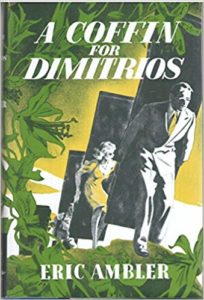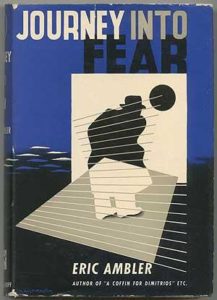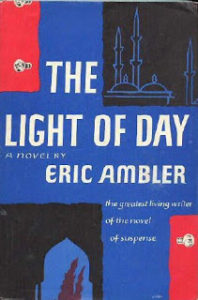Eric Ambler was the father of the modern thriller. That’s a big statement, but you don’t need to take my word for it. John Le Carré called him “the source on which we all draw,” and Len Deighton, “the man who lit the way for us all.” Frederick Forsyth said he was the man “who took the spy thriller out of the gentility of the drawing room and into the back streets where it all really happened,” and Graham Greene declared him simply “unquestionably our best thriller writer.” He won many Edgar and CWA Dagger awards, including lifetime achievement honors from both, and in 1981, was made an officer of the Order of the British Empire.
Before Ambler, international thrillers tended to be dominated by such writers as John Buchan, Herman Cyril McNeile (known as “Sapper”), and their many imitators. These books were often rousing adventures, but filled with improbabilities, both of plot and character, plus a hearty jingoism and a well of right-wing, Old World prejudice that would curl your hair today.
Ambler was having none of it. The villains were totally implausible, he wrote in his memoir, titled with typical Amblerian double-meaning, Here Lies, and the hero “could be a tweedy fellow with steel-grey eyes and gun pads on both shoulders or a moneyed dandy with a taste for adventure. He could also be a xenophobic ex-officer with a nasty anti-Semitic streak. None of that really mattered. All he really needed to function as hero was abysmal stupidity combined with superhuman resourcefulness and unbreakable knuckle bones.”
Ambler’s heroes, especially in his brilliant run of between-wars novels published between 1936 and 1940, are very unexceptional sorts, the quintessence of ordinary people caught up in extraordinary circumstances. They are often engineers or journalists or writers who stumble unexpectedly into danger through a combination of bad judgment and bad luck, and then have no choice but to try to dig themselves out of it on their own, because no one is likely to help them. They are often solidly middle class, raised in a world of black-and-white certainties that they discover has been completely obliterated by an infinite variety of grays.
Ambler’s villains live in that gray. They are criminals, con men, governments, corporations, spies, revolutionaries, and corrupt officials of every kind. They don’t come around rubbing their hands in glee at their dastardly master plans. They are realists. They have made their own calculations about what it takes to succeed and are willing to do whatever is necessary to achieve that goal. If those acts are considered reprehensible by others, well, that’s not their problem.
As Ambler says of the title character in A Coffin for Dimitrios, “It was useless to try to explain him in terms of Good and Evil. They were no more than baroque abstractions. Good and bad business were the elements of the new theology. Dimitrios was not evil. He was logical and consistent.”
What the men like Dimitrios know, and Ambler’s heroes only gradually discover, is that the world doesn’t care about them at all. They are all flotsam on the tides of massive financial and geopolitical forces, and those forces were particularly strong during the time of Ambler’s first six novels from The Dark Frontier (1936) to Journey Into Fear (1940). World War I had left the world in a shambles, out of which fascism had sprung and was quickly spreading across Europe. Economies were bad, nations splintered, governments unsteady. A justified uneasiness lay over everything. In fact, Ambler would later recall, the year The Dark Frontier was published was “the year in which Italy invaded Abyssinia, civil war broke out in Spain, and Hitler ordered the German army to reoccupy the Rhineland. It was a year of yet more refugees and of marriages arranged to confer passports. It was also the year in which the League of Nations was at last seen plainly to be impotent. These where the things that I was trying, in my own fictional terms, to write about.”
Ambler was born in 1909, the son of two music-hall performers who ran a traveling puppet show. Keen-minded, he won a university scholarship to study engineering—an interest that would be evident in several of his books, not the least of which was his first novel, The Dark Frontier, in which his hero worked to defeat a ring of Balkan intriguers developing an atomic bomb. Remember, this was in 1936.
Bored with university, though, he dropped out after two years and tried his hand at various things, including plays, a fling with the music halls himself, and a job as an advertising copywriter, before chucking it all and moving to Paris. Europe had seeped into his bones, and he began the first half-dozen books that still cast an outsized shadow today.
“It was useless to try to explain him in terms of Good and Evil. They were no more than baroque abstractions. Good and bad business were the elements of the new theology. Dimitrios was not evil. He was logical and consistent.”And then the war intervened. Ambler joined the army (when the recruiting officer asked his occupation, he said, “I’m a writer.” “Yes,” the man said, “But is there anything you can actually do?”). He was eventually assigned to the army film unit, where he worked on training films and documentaries alongside such figures as Peter Ustinov, Carol Reed, and especially John Huston, who was covering the American invasion of southern Italy for what would become his famous documentary San Pietro.
This began a long relationship with the movies, which included scripts for a dozen movies, including his Oscar-nominated work on The Cruel Sea (1953) and the screenplay for A Night to Remember (1958), the most famous of all Titanic movies, pre-Leonardo DiCaprio. A number of his own books also turned into films, and he would eventually marry Joan Harrison, a producer, screenwriter, and long-time right hand of Alfred Hitchcock.
He resumed his novels in 1951 and would write twelve more books between then and 1981. The heroes would evolve from the haplessness of the early books to more self-assured characters to the kind of shady individuals that he might once have used as villains. However, the books remained diamond-hard, if sometimes with a humorous touch, and cast an unsparing eye on global politics and the nefarious forces that drove them.
In Judgment on Deltchev (1951), Ambler, once left-leaning, as many anti-fascists had been in the 1930s, took a skewer to the horrors of Stalinism. State of Siege (1956) explored the vividly realistic and appalling course of a failed coup d’etat. Passage of Arms (1959) looked at the ramifications around the discovery of a cache of guerrilla arms in Southeast Asia. Dirty Story (1967) involved the battle over oil fields by two African countries. The Levanter (1972) was a stark examination of Palestinian plotting against Israel. Dr. Frigo (1974) followed the scheming of a group seeking pover over a Caribbean island. His final novel, The Care of Time (1981) tackled chemical warfare, but in typical Ambler fashion: A writer receives a bomb in the mail, and to keep it from detonating, he must ghostwrite an expose of modern terrorist governments. But as the writer soon discovers, there’s a lot more going on than that—and he begins to wonder if it wouldn’t have been less painful if the bomb had just gone off.
Ambler died in 1998 at the age of 89. In a 1981 interview with the New York Times, he had this to say: “Thrillers are respectable now. Back in the beginning, people weren’t quite that sure about them, [but] they really say more the way people think and governments behave than many of the conventional novels. A hundred years from now, if they last, these books may offer some clues to what was going on in our world.”
__________________________________
THE ESSENTIAL AMBLER
__________________________________
With any prolific author, readers are likely to have their own particular favorites, which may not be the same as someone else’s. Your list is likely to be just as good as mine—but here are the ones I recommend.

A Coffin for Dimitrios (1939)
I’ve worked with many writers of international suspense, and whenever I’ve wanted to recommend a book to any of them that captures the genre as well as any book possibly can—this is the one I send them to. I’ve loaned it out so many times that I must have bought five or six copies over the years. I had to buy a new one just to write this piece.
A mystery writer named Charles Latimer, looking for a change of scene, travels to Istanbul, and there meets a Turkish official named Colonel Haki, rumored to be the head of the secret police. Haki buttonholes him because he’s thought of a brilliant twist ending for a country house murder plot (the butler does it!), but while he has Latimer’s attention, he also regales him with the history of a notorious gangster/murderer/drug-runner/white-slaver named Dimitrios Makropoulos, whose corpse has just washed up in the Bosphorus. Latimer is fascinated, and decides on the spot this should be the subject of his next book—he’ll trace the man’s complete story, go to all the places he’s been, ask questions, and present him to the world: “It would be an experiment in detection really.”
Do I have to tell you how bad an idea this is? I’m sure I don’t. Latimer himself gets an inkling of it the first time he finds himself on the business end of a gun, but even then he has no idea of the hornet’s nest he has stirred up. In the meantime, Ambler has provided us with elegant, lively and truly appalling lessons in Balkan politics, espionage, and the criminal mind.

Journey into Fear (1940)
“He looked round the cabin, accepting his presence in it as he had accepted so many other absurdities since he had returned to his hotel in Pera the night before. The acceptance was unquestioning. He felt only as if he had lost something valuable. In fact, he had lost nothing of any value but a sliver of skin and cartilage from the back of his right hand. All that had happened to him was that he had discovered the fear of death.”
An engineer we know only as Graham has just been nearly killed in his hotel room in Istanbul. He works for a large British munitions company and is in Turkey to help with the rapid rearming of the Turkish fleet. He thinks he must have interrupted a thief, but a Turkish official (Colonel Haki, making a cameo return!) bluntly disabuses him of that notion. The naval authorities of Germany, Italy, and Russia know perfectly well why Graham is there, and will do anything to keep that rearmament from happening. When Graham demurs that this all seems too melodramatic—“This is real life, not the cinema”—Haki explodes (“Melodrama! Proof! Real life! The cinema!”), informs Graham that they’ve already intercepted one other plot against him, and that a third is likely to succeed: “Do you understand now, Mr. Graham? Has your excellent brain grasped what I have been trying to say?”
Haki won’t let him return to London by train (“You would be dead before you reached Belgrade”), and puts him secretly on a small cargo boat to Genoa, from where he can easily get to the French frontier and then on home.
Things aren’t that simple, of course. Also on board that boat are a pair of Nazi assassins, a Turkish secret agent, and a Spanish courtesan and her pimp, among others. Some of them are there to kill him, some to keep him from getting killed, and some…are surprises. Much to his own astonishment, Graham turns out to be a bit of a surprise, too.

The Light of Day (1962)
“It came down to this: If I had not been arrested by the Turkish police, I would have been arrested by the Greek police.”
The “hero” of The Light of Day is one of the minor criminals and con me that Ambler delighted to write about in some of his later books. He is Arthur Abdel Simpson, a pimp, pander, guide, pornographer, and sneak-thief, who has “only been arrested 10 or 12 times.” He can be a bit of a bumbler, but his senses are acutely tuned to self-preservation, and he always has his eye on the main chance, no matter how sketchy it might be. (“Is it a crime to earn money? The way some people go on, you would think it was.”)
Simpson’s latest scam is to scan arrivals at the Athens airport, pick a mark, offer his services as a driver, and then later go back and burgle the man’s hotel room. This time, however, he picks the wrong guy, an American named Harper, who turns the tables and blackmails him into doing just a little job for him—driving a car from Athens to Istanbul. The only problem is, when Simpson is stopped at the Turkish border, it turns out that within the car’s doors lies a small arsenal. Is it for a coup attempt? An assassination?
As it turns out, it’s much more interesting than that, but we don’t learn what Harper and his confederates are up to until about three-quarters of the way through the book, so if you don’t know already, I’m not going to say. Just rest assured that it is well worth the wait, and the result has been beloved by crime fiction fans—and writers—ever since. For a hint (spoiler alert!), see the bonus material below.
__________________________________
MOVIE BONUS
__________________________________
 Sydney Greenstreet and Peter Lorre in “The Mask of Dimitrios” (1944)
Sydney Greenstreet and Peter Lorre in “The Mask of Dimitrios” (1944)
All three of the books above were made into movies. A Coffin for Dimitrios, under the original British title of The Mask of Dimitrios, in 1944, starred Peter Lorre and Sydney Greenstreet, and Journey Into Fear in 1942 starred Orson Welles and Joseph Cotton. (I know! I can see you all sitting bolt upright now, searching for where you can get your hands on them) It’s been reported that Welles actually edited the last reel of Journey himself and filmed additional scenes, though Welles has denied it.
The Light of Day was made in 1964 as Topkapi, a much-beloved caper film starring Peter Ustinov, Melina Mercouri, Robert Morley, and Maximilian Schell. It won Ustinov a best supporting actor Oscar, and later served as the inspiration for the TV series (and now Tom Cruise movie franchise) Mission: Impossible. Also reputedly inspired by Topkapi, an ambitious thief named Jack Murphy, aka Murph the Surf, whom that same year carried off the “Heist of the Century,” when he and a buddy broke into New York’s Museum of Natural History and made off with the world’s largest star sapphire, the Star of India.
Besides these movies and his own screenplays, Ambler was also one of several uncredited writers on the failed 1962 remake of Mutiny on the Bounty, starring Marlon Brando. “It was hopeless,” said Ambler later. “His demands went up and up—but he knew less and less what he wanted.” After fourteen drafts, Ambler was done with it.
__________________________________
BOOK BONUS
__________________________________
Using the pseudonym Eliot Reed, Ambler also collaborated on five books between 1950 and 1958 with a writer named Charles Rodda: Skytip, Tender to Danger, The Maras Affair, Charter to Danger, and Passport to Panic. According to Here Lies, the agreement was supposed to be that Ambler would make up a plot and Rodda would write the books, but Ambler claimed that much of the writing in the first two was actually his, and that after that he had very little to do with the Reeds. These books can currently be found on Amazon under the name of Eric Ambler—so, buyer beware.
__________________________________
QUOTE BONUS
__________________________________
“The important thing to know about an assassination or attempted assassination is not who fired the shot, but who paid for the bullet.”
- A Coffin for Dimitrios
“Never tell a lie when you can bullshit your way through it.”
- Dirty Story
“Reality is always so obstructive.”
- Epitaph for a Spy
“Propaganda always begins with words, but soon it proceeds to deeds. When there are no facts to support lies, facts must be made.”
- A Coffin for Dimitrios

















